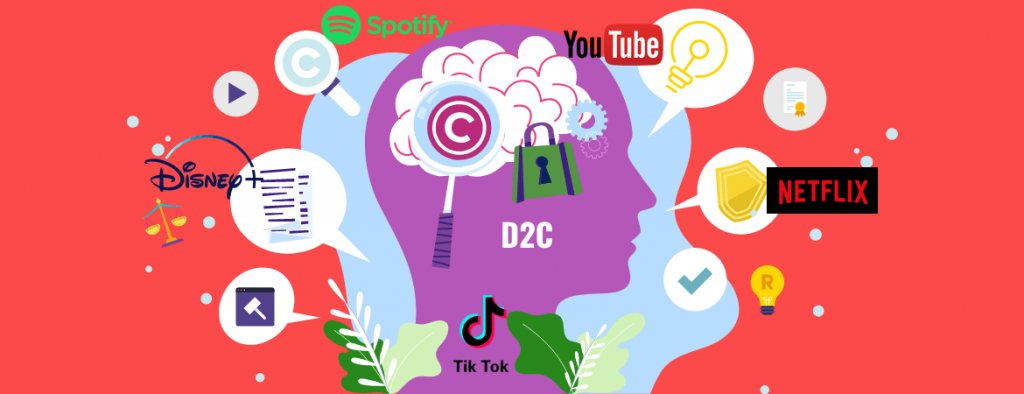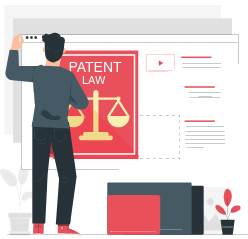Money. Fame. International exposure. Working with movie stars. Helping entrepreneurs to build powerful brands and scientists to make their dreams come true. Rock and roll.
IP law probably fascinates a lot of you already, but I suspect you have no idea how it is changing and what kind of monumental opportunities are shaping up in this space. I started studying the most important developments in the legal career space in 2020, and came to the conclusion that IP law is the most underrated area of practice right now, given how much is going on here.
IP law is exploding like nothing else. If you find that hard to believe, read on to understand why.
OTT content platforms
You couldn’t have missed the success of Netflix, Spotify, Amazon Prime, Hotstar and dozens of other region or language specific OTT (over-the-top) platforms as a trend. OTTs have resulted in massive growth in both content creation and distribution. Number of viewers have also gone up drastically, with hundreds of millions of fans binge watching series after series in perhaps a way that raises other concerns. However, for media business, this is holy grail!
However, what opportunities has this created for IP lawyers?
- There has been a drastic increase in media contracts that deal with intellectual property – content development, distribution, and monetization, consultancy, freelance and employment contracts, profit sharing and joint development agreements, investment agreements, satellite rights agreements and so on.
- To produce content licenses – music sync, adaptation, biographical story, image licenses – there is a massive amount of work.
- Platforms work hard to bring top content creators on their platforms – and spend big money on such deals. Think of blockbuster series or movies, music or even podcasts like Joe Rogan Show that was acquired by Spotify through an 100 million USD deal. Lawyers work on these deals as well.
- There are compliance concerns in this business too – although mostly as self-regulation. There can be legal content restrictions as well. For instance, in India, showing smoking on screen can attract legal liabilities. Similarly, if you end up with a defamation suit or setting off a riot over some content, that could be legally and otherwise expensive. Vetting of all content by lawyers has become the norm, generating a lot of work for lawyers.
- Of course, there are legal requirements for statutory compliances during production as well. As production units go up in number and more people work in production of content, there are associated legal and tax work. It is not what IP lawyers do, but IP law firms often have lawyers who specialise in meeting these needs of their clients.
- Taxation of IP, tax compliance, taxation of international income have become major headaches for this industry and there are a lot of lawyers working on these aspects as well.
- Global IP enforcement challenges have become significant – and lawyers are being called on to protect copyright and trademark. In the OTT world, a series made in India could have viewers in China, USA, Australia or even Sub-Saharan Africa. If you sell the content to a certain TV channel, while locally people are freely pirating the same, you will damage your market. Hence, lawyers are now needed to be able to enforce copyright across the world. This was once the case with Hollywood, but now increasingly lawyers in every country need this skillset.
- Need to register a trademark globally rather than locally is also the reality today. Imagine how a local Spanish language series Money Heist became a global favourite and in 2020. 167 million subscribers in over 190 countries have been bingeing on it. It is also a massive merchandise success, with global audiences lapping up t-shirts, coffee mugs, wall hangings and even face masks that remind them of their favourite TV show. Imagine the importance of trademark enforcement across the world to make sure that the merchandising rights owner actually take home a part of the pie.
YouTube, TikTok, Starmaker and online video platforms – explosion of copyright infringement
Copyright infringement cases are not that common. However, with the rise of user generated content platforms that is changing really fast.
- YouTube was the first battleground of copyright infringement, but with dusts settling there, lawyers still are quite busy sending copyright notices and dealing with YouTube’s copyrights claim platform nonetheless. There are even specialist organizations who do this work exclusively and some of them send tens of thousands of legal notices every year.
- With the advent of platforms like TikTok, Dubsmash, Sharechat, Likee, Starmaker and countless others, there is a massive amount of content being copied. In some cases, the content owners do not mind someone making a meme or a cover of their music – but when those user generated videos go viral and millions of people watch them – they begin to wonder – am I leaving too much money on the table?
- Content owners are not really interested in getting such content off the internet, rather, they benefit from that extra exposure. However, the platforms are making money from user attention and engagement, they want a piece of that action, which only seems fair. And this is leading to a lot of legal actions, claims, settlements as well as disputes that get dragged to court.
- Even Google and Facebook are being forced to pay up news content producers in some jurisdictions, such as in Australia, a trend that is expected to take shape globally in the next few years.
- Of course, there are plenty of outright piracy matters too, which remain the number one headache of original content creators, movie studios and anyone else in the content business. Work for lawyers will continue to increase in this area too, especially for those who will use tech tools to automate such legal work.
Businesses and industries going online post-pandemic
Another unexpected windfall for IP lawyers has happened from the post-pandemic rush for offline businesses to go online.
Going online means you need to have a distinct brand.
Offline businesses can afford to be informal, unstructured, and can operate without a brand.
You can find a thousand local shops with the exact same name. Darjeeling Tea House, for example, could be the name of hundreds of local tea retailers in Kolkata when I was growing up there. There must be ten thousand Doshokorma Bhandars as well.
It didn’t matter due to the localised nature of business that 30 shops in the same town had identical names. But this does not fly online. Each online business needs to operate with a distinct brand.
As local small and offline businesses lost market share rapidly, the number of businesses that went online increased. This is not a one time or temporary phenomenon, this is what the future looks like.
You can see this from the massive growth in new Shopify accounts. They are alone handling a GMV of 100 Billion USD in 2020! In India too, a whole bunch of dukan tech software providers are competing to take local retail shops online.
Once you go online, two fundamental changes happen. You pay taxes, and you need to have a brand.
If you need to have a brand, you have to hire IP lawyers. Sure these clients will not pay like MNCs, but it is a nascent and significant market with massive depth.
Going forward, most of new businesses will be created as formal businesses, which would want to have an online presence apart from offline presence, and they will have to take branding and trademark seriously. Some of them will hire service providers to register their trademarks while others may end up violating trademarks or copyright of other businesses, leading to increased work for IP lawyers in any case.
This is amazing news for every IP lawyer. It is a game changer by all measures.
D2C brands – explosion of new brands
E-commerce has changed how we interact with the products we buy. Online marketing did not only create space for more brands, it also gave a potent tools to manufacturers and brand owners to escape the middle man, and reach their users directly using social media and other online means.
The middle-man is usually not one person, but an entire supply chain including the local retail store, stockists, distributors, even the large departmental stores!
Today people may be buying clothes, cosmetics, even gadgets not from a store, not even online marketplaces like Amazon or Flipkart, but increasingly from the producer or a brand directly.
I don’t know about you, but I have often been buying t-shirts (nanotechnology based wrinkle free, stain free and super stretchable!), coffee (exactly the premium kind I want), supplements, workout equipments, etc. directly from D2C brands that operate only online.
In India, D2C is still relatively new but a strong trend. In the USA, the success of the Dollar Shave Club and Caspers Mattress is legendary. D2C commerce is projected to maintain a further 19.2% growth in 2021.
However, D2C means instead of a few large consumer brands, today’s marketplace is being taken over by hundreds of smaller niche brands with loyal followers.
This trend is, again, a game changer for IP lawyers. Rise of D2C commerce will no doubt give a further boost to IP law practice now and in the years to come.
I think that is enough for today, I will tell you the rest tomorrow!
I am going to write to you about a bunch of other trends that are permanently changing the practice of IP law and giving birth to unmistakably lucrative, untapped opportunities. However, you have to wait till tomorrow.
Ok, Let me just mention them in bullet-points here. Look out for the 2nd part of this article to read in detail about these trends tomorrow.
- Explosion of gaming and fantasy Sports
- Influencers and online content creators
- Voice commerce
- Merchandising and social selling
- Online Reputation Management
- ESG and moral concerns of buyers
- Massively growing investment in emerging technology
IP is clearly set to become much more exciting than what it is today. Definitely make sure you do not miss the second part of this article. If you are excited to see the list above, wait till you see the entire analysis!
Also, Join us for free & online 3-day bootcamp on “𝗛𝗼𝘄 𝘁𝗼 𝗸𝗶𝗰𝗸𝘀𝘁𝗮𝗿𝘁 𝘆𝗼𝘂𝗿 𝗶𝗻𝘁𝗲𝗿𝗻𝗮𝘁𝗶𝗼𝗻𝗮𝗹 𝗽𝗿𝗮𝗰𝘁𝗶𝗰𝗲 𝗶𝗻 𝗜𝗣 𝗹𝗮𝘄𝘀?” from 20th to 22th November, between 6-9 pm and learn how to tap into lucrative international IP law work that you will not want to miss. [CLICK HERE]
In the meantime, you can join our group by clicking on the link below
https://chat.whatsapp.com/CLa6IUsKzxQCVtJ5YljpnO
LawSikho IPR Community WhatsApp group where you will meet some of the foremost global IP practitioners and get daily insights on IP law.
Looking forward to touching base with you tomorrow. Toodles.
Next Part: Massive global trends that are shaping IP law practice and creating unprecedented opportunities
Students of Lawsikho courses regularly produce writing assignments and work on practical exercises as a part of their coursework and develop themselves in real-life practical skills.
LawSikho has created a telegram group for exchanging legal knowledge, referrals, and various opportunities. You can click on this link and join:
https://t.me/lawyerscommunity2
Follow us on Instagram and subscribe to our YouTube channel for more amazing legal content.








 Allow notifications
Allow notifications

Pingback: Massive global trends that are shaping IP law practice and creating unprecedented opportunities - Lawsikho Blog
Nice read on the emerging practices for IPR practice.
Agriculture technology
What you provide for enhancing the profession
I am interested!
I am interested
Pingback: Why has intellectual property law emerged as a top career choice in 2020? - Lawsikho Blog
This is such an amazing article to read am really Impressed by this article here
Keep up the good work man!!
Nice read on the emerging practices for IPR practice.
This is one of the best in class article I have ever seen.
Thank you for sharing!!
good blog
This article is actually a nice one it helps new the web viewers, who
are wishing in favor of blogging.
Nice post IP law practice
Thank you for enlightenment in this line of career for young and struggling advocates
I have a query regarding Internship opportunities.
Do this firm help us to grab new Internship opportunities.
South East Asia comprises of countries at varied levels of development. As a booming business hub, it brings a variety of challenges for HR in the region. Read this article to learn how South East Asia is posed to overcome these challenges.
Hi
Hello, sir ma.am